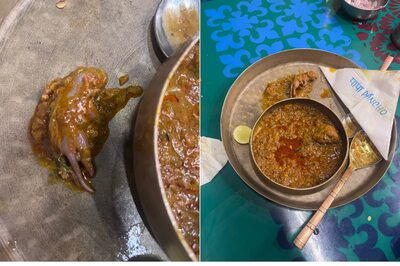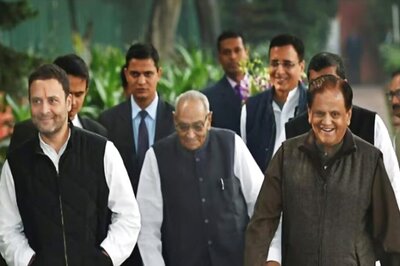
views
New Delhi: CBI director Alok Verma and special director Rakesh Asthana have been divested of all powers in the midst of an internal rift over bribery allegations against the latter. As per a government order, CBI joint director M Nageshwar Rao has been given the charge of interim director of the investigating agency with immediate effect.
However, this leaves a lot of questions unanswered; such as the genesis of the entire controversy and how the government could order the removal of a CBI director. News18 explains some critical aspects:
What is the genesis of the crisis in CBI?
Rakesh Asthana was working with the CBI as a deputy before he was elevated as the special director of the agency in October 2017. However, when Asthana’s name was being mulled for the role of the special director, the then CBI director, Alok Verma, had informed the Central Vigilance Commission of the former’s alleged role in a corruption case related to Sterling Biotech in August 2017. Based on a note found on the premises of Sterling Biotech, the director had alleged that Asthana was paid a bribe of Rs 3.88 crore. However, the CVC panel did not let this allegation affect Asthana’s appointment and he was soon made the director of the agency.
The crisis escalated in June 2018 when Verma again wrote to the CVC, informing that Asthana could not take part in a CVC meeting of CBI appointments as there were corruption cases against him. Asthana lashed back at Verma, stating that the CBI director was not allowing him to work independently. He alleged that Verma was posing to be a hurdle in the investigation of the IRCTC scam and with cases against RJD supremo Lalu Prasad.
In August, Verma registered an FIR against Asthana in alleged corruption cases.
What are the allegations that Asthana made against Verma?
In August, Rakesh Asthana wrote to the cabinet secretary, alleging corruption by Alok Verma. He mentioned that an alleged bribe of Rs 2 crore was paid by Hyderabad-based businessman Sathish Sana to settle the probe against meat exporter Moin Qureshi by the CBI. Asthana was then heading the SIT probing the Qureshi case.
What are the allegations against Asthana?
On September 21, the CBI told the CVC that Asthana was facing probe in six cases of corruption.
This was followed by the questioning of Sathish Sana, who had been prevented from flying abroad, and arrest of Mohan Prasad, a Dubai-based middleman. He had apparently flown to Delhi to collect a part of the bribe amounting to Rs 1.75 crore. His arrest and subsequent statement led to registration of an FIR by the CBI against Asthana.
Asthana allegedly demanded a bribe of Rs 5 crore from a Hyderabad-based businessman through two middlemen to help him get off the hook in the Moin Qureshi case. The CBI has stated that money to the tune of at least Rs 3 crore had already been paid to Asthana through the middlemen.
The CBI has submitted that it has enough evidence in the form of messages exchanged on WhatsApp showing the bribes were paid. However, it has been mentioned that Asthana was never directly in touch with the middleman.
Was there a PIL against Asthana?
After Asthana's appointment as the special director, a Public Interest Litigation (PIL) was moved in the Supreme Court seeking quashing of his appointment, alleging “violation of guidelines on the appointment”. The PIL alleged the appointment was also in violation of Lokpal and Lokayukta Act of 2013. Prashant Bhushan argued the case.
The PIL contended that the appointment was “illegal, arbitrary, mala fide and in violation of the principle of impeccable integrity and institutional integrity”. It was quashed by the SC.
Is prior approval necessary before filing an FIR against a serving public official?
According to Section 17A of the recently amended Prevention of Corruption Act, “No police officer shall conduct any enquiry or inquiry or investigation into any offence alleged to have been committed by a public servant…, where the alleged offence is relatable to… (the) discharge of his official functions or duties, without the previous approval… of the government. …No such approval shall be necessary for cases involving arrest… on the spot on the charge of accepting or attempting to accept any undue advantage…”
Asthana's lawyer Amarendra Sharan had immediately moved court on Tuesday after Asthana was divested of all powers by Verma. While the court ordered to maintain status quo in the ongoing probe and granted him interim protection from arrest till Monday, the lawyer had then argued that as per Section 17A, which was newly inserted after the 2018 amendment to Prevention of Corruption Act, prior sanction was necessary for investigation against a serving officer. He also told the court that no sanction has been issued by the competent authority, Department of Personnel and Training (DoPT).
However, counsel K Raghavachari arguing for CBI stated that since the case against Asthana was that of bribery and not of abuse of official position in connection with a decision taken on policy or otherwise, this would not fall under the purview of Section 17A.
What is the status of investigation now?
DIG Tarun Gauba will investigate the allegations against Asthana. Gauba had also probed the Dera Sacha Sauda case.
Highly placed sources have told News18 that transfers will have no bearing on investigations in sensitive cases and that they are on track. This is the basis of Verma’s plea in the SC too that such sudden divesting of powers may impact investigations in other sensitive cases.
Can the government order the removal of a CBI director?
Whether the government can order the removal of a CBI director is the basis of the petition that senior lawyer Prashant Bhushan is about to file in the Supreme Court.
Bhushan has claimed that the sacking of the director is completely illegal. He has stated that a CBI director has a fixed tenure of two years as mandated by the top court and the committee which appoints him can only remove him before the expiry of the tenure on the basis of disciplinary issues. Bhushan alleges that there has been government interference in the removal of the CBI chief.
The government, according to sources, has told News18 that the decision was taken by the Central Vigilance commissioner. However, Bhushan has dismissed such a contention stating that CVC has “no authority” to remove Verma.
Under what statute are the officers appointed?
The director of the premier investigating agency is appointed under the Lokpal Act. However, before the Lokpal Act was brought in 2013, the appointment of the CBI director was done under the Delhi Special Police Establishment Act.
In accordance with the act, the list of eligible candidates was prepared by a panel comprising the Central Vigilance Commissioner as chairperson, other vigilance commissioners, Home Secretary and Secretary (Coordination and Public Grievances in the Cabinet Secretariat). Their recommendations had to be approved by senior government functionaries and the final decision would be taken following consultations between the PMO and Home Ministry.
However, post 2013, appointments have been made under the Lokpal Act. The first list of officers under the act is prepared by the Ministry of Home Affairs. The list is formulated on the basis of seniority and experience in investigations.
The list is further vetted by the Department of Personnel and Training, which puts the list under check for seniority, integrity and investigation experience. The list then goes to the Lokpal Search Committee, comprising the Prime Minister, the Chief Justice of India and the Leader of the Opposition. In case the CJI is not available, he can depute a representative.
If no party in Opposition is large enough to get the position of Leader of the Opposition, the leader of the largest Opposition party can attend. The search committee examines the names and sends its recommendation to the government. However, the decision of the committee need not be unanimous and only majority view is taken into consideration with a dissent note in place of the members who have dissented recording their reasons to do so.
Who is M Nageshwar Rao?
IPS officer M Nageshwar Rao took over as the interim director of the Central Bureau of Investigation (CBI) on Tuesday.
Nageshwar Rao is an Indian Police Service (IPS) officer of the 1986 batch from the Odisha cadre. Rao's first posting was as a Sub-Divisional Police Officer (SDPO) in Odisha's Talcher in 1989-90, where he demonstrated his tough-cop qualities.
He supervised the chit fund scams and the Saradha scam in Odisha and West Bengal.
Rao was the first officer in Odisha to use the DNA finger printing technique in crime investigation for detecting a rape case in Jagatsinghpur district in 1996.
His anti-insurgency works in Manipur as DIG (Operations) of CRPF earned him lot of appreciation. As IGP, CRPF, Eastern Sector, Kolkata he personally led Lalgarh operations against the Naxals in 2008.
Rao was instrumental in establishing CoBRA Battalion of CRPF and sanctioning of second Group Centre of CRPF in Odisha at Sambalpur. As IG CRPF, Rao played a key role in defusing tension in riot-hit Kandhamal in 2008.



















Comments
0 comment